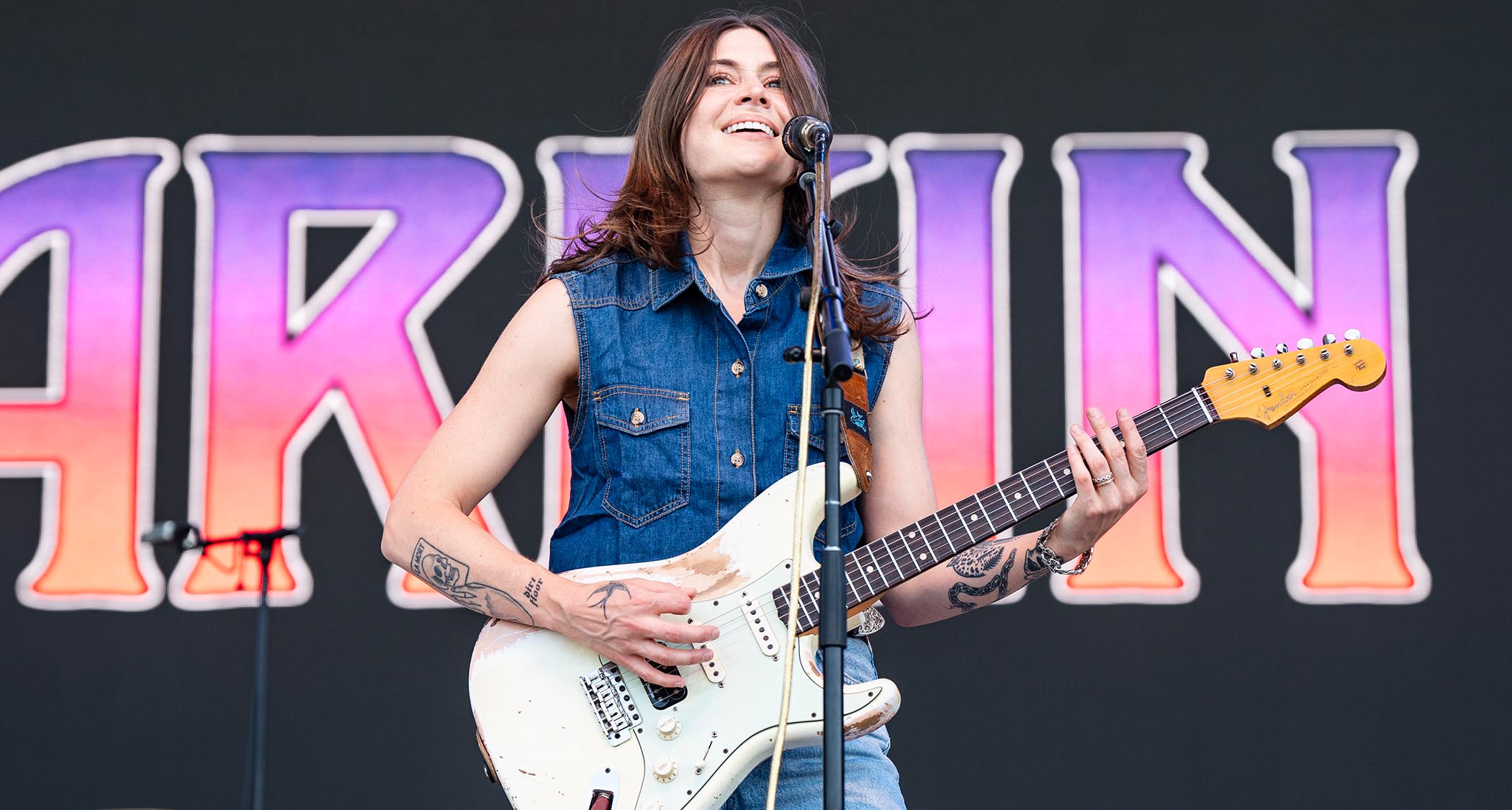
With the Fender Stratocaster blowing out the candles on its 70th birthday cake, Guitar World has been celebrating Leo Fender’s storied double-cut by checking in with some of its biggest fans – the pros who choose the instrument as their number one electric guitar.
Now it’s the turn of Larkin Poe’s Rebecca Lovell to pay tribute to the Strat, and explain why she chose it.
What first attracted you to the Strat?
“My introduction to Fender guitars was a Jazzmaster. One of my heroes is Elvis Costello, and he always has that signature profile with the beautiful Jazz, so I started playing it on stage.
“I’m 5’ 6”; I’m not huge and I’m not tiny, but I was struggling to run around with a guitar of that great stature. So being able to pick up something that was a little bit lighter weight, smaller and aerodynamic made sense.”
How has the Strat shaped the way you play?
“I’m certainly a different player. The Stratocaster is so idealized, you know, when you think about the history of the level of musicianship that it has attracted, from Jimi to Stevie [Ray Vaughan], like, those are two out-of-the-box ultimate guitar heroes. But even from my perspective, players like Bonnie [Raitt] or Susan Tedeschi with a Strat are the individuals who paved the way for what’s possible for players who look more like me.
“So I’ve continued my journey with the Strat, understanding that it’s like a symbol of rock. Being able to roll that energy into your level of musicianship with those who’ve come before and allowing that to carry along with the momentum of whatever stories and licks I’m trying to bring to the guitar, it begins to pile on, if you will.”
What’s your go-to Strat?
“My husband [Tyler Bryant] is also a Strat player, so the first Strat I started taking out on the road just to toy with was one of his, which is a ’60s-style Shell Pink with a white overlay. I was so taken by the HSS [pickup configuration] situation. So the first Strat I bought for myself as my main guitar is Vintage White with the humbucker in the bridge.
“I ultimately put a tortoiseshell pickguard on it, and that’s my main baby. It’s starting to get a lot of cool wear; I love that you can see a player’s personality through the wear their guitars slowly amass over time.”
Have you modified your Strat at all?
“I’ve kept my main guitar pretty stock. I’m nerd-ish, you know? I have some nerd qualities, like digging into the details, but I’m kind of plug-and-play. Once I find something that works, it takes a lot for me to dig in and tweak things. I have the energy with my guitars of, ‘If it’s working, or it ain’t broke, don’t fix it.’”
Is there really much difference between a vintage Strat and a new one?
“Guitars, like any man-made inanimate object, attract energy over time. When you pick up some guitars, you just sense the weight of time that they possess. But I think it really is in the setup. I’ve played super-cheap Strats that have a good setup, and, for me, that’s half the battle.
“I’m not a fairly pragmatic player; I love the romance of a guitar with a story. The beauty of human experience is that we can imbue meaning into stuff. But also, it’s like, dude, if you can find a luthier in town, or a good setup guy, you can take a piece of junk, get it set up, and it’ll play as good as anything you’ve ever touched.”
One of a Strat’s best features is its five-way switch. Which position do you favor most?
“To be honest with you – and this is something I’m trying to get more competence on – I’m always on the bridge. [Laughs] There is no part of my stage show right now where I’m anywhere else but the bridge, which is a little bit lacking in imagination.
“Because the guitar, like, clearly the Strat is so versatile. In the studio, I’m all touchy-feely with the neck, my blend and all that stuff. But onstage, I like it balls to the wall, so that’s something I do want to engage with more.”
What does the Strat mean to you?
“Humans are storytellers. We’re memory keepers. We can exist in this world, take a barrage of random circumstances and sheer randomness and make meaning from them. And that beautifully represented skill set we possess is represented in an abstract concept like a Stratocaster.
“Being able to build something and give it a story that goes out into the world and is independent of us makes you feel so many things. So, from where I sit, the Strat really is one of the greatest symbols of rock ’n’ roll. The profile, aerodynamics and art quality of the instrument breathe rock ’n’ roll. So that’s what it means to me.
“I feel like I’m continuing that story whenever I pick up a Strat and carry it on stage. And that’s sick, you know? It just feels awesome to play a Strat and be a part of the ongoing chain of generations that is making the Stratocaster what it is.”
- Blood Harmony is out now via Tricki-Woo.







